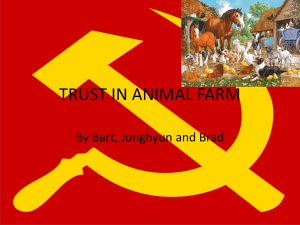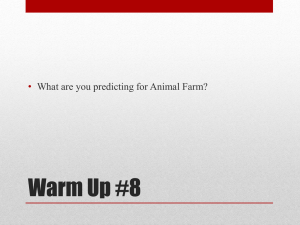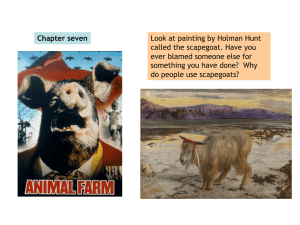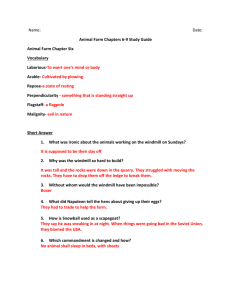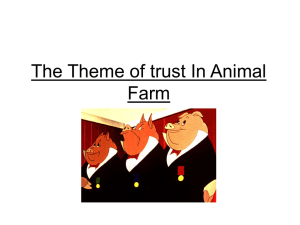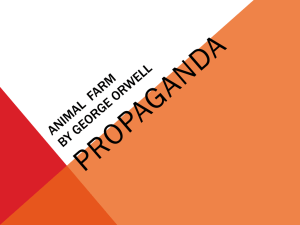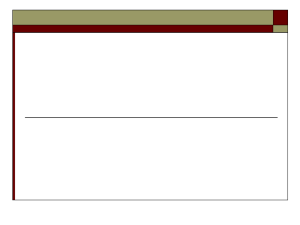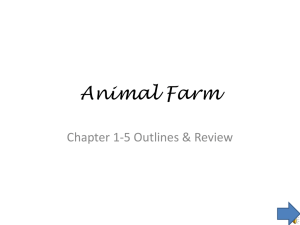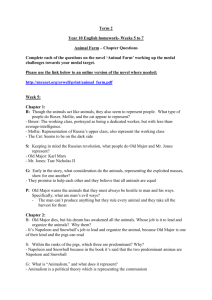Animal Farm Study Guide (Answer Key)
advertisement
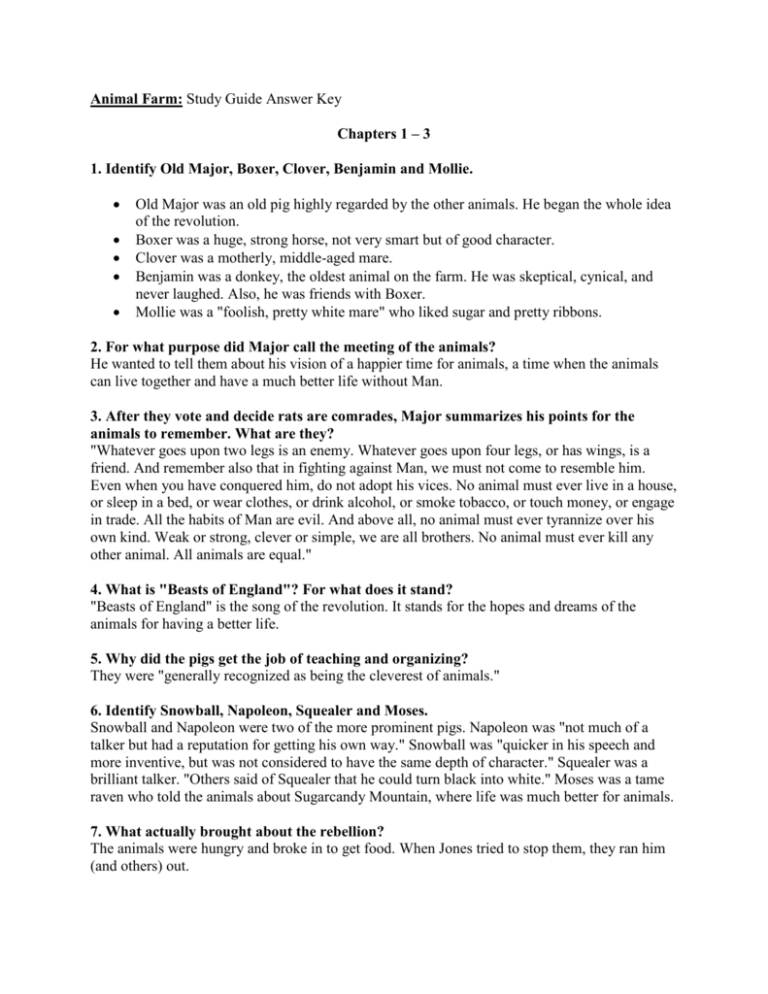
Animal Farm: Study Guide Answer Key Chapters 1 – 3 1. Identify Old Major, Boxer, Clover, Benjamin and Mollie. Old Major was an old pig highly regarded by the other animals. He began the whole idea of the revolution. Boxer was a huge, strong horse, not very smart but of good character. Clover was a motherly, middle-aged mare. Benjamin was a donkey, the oldest animal on the farm. He was skeptical, cynical, and never laughed. Also, he was friends with Boxer. Mollie was a "foolish, pretty white mare" who liked sugar and pretty ribbons. 2. For what purpose did Major call the meeting of the animals? He wanted to tell them about his vision of a happier time for animals, a time when the animals can live together and have a much better life without Man. 3. After they vote and decide rats are comrades, Major summarizes his points for the animals to remember. What are they? "Whatever goes upon two legs is an enemy. Whatever goes upon four legs, or has wings, is a friend. And remember also that in fighting against Man, we must not come to resemble him. Even when you have conquered him, do not adopt his vices. No animal must ever live in a house, or sleep in a bed, or wear clothes, or drink alcohol, or smoke tobacco, or touch money, or engage in trade. All the habits of Man are evil. And above all, no animal must ever tyrannize over his own kind. Weak or strong, clever or simple, we are all brothers. No animal must ever kill any other animal. All animals are equal." 4. What is "Beasts of England"? For what does it stand? "Beasts of England" is the song of the revolution. It stands for the hopes and dreams of the animals for having a better life. 5. Why did the pigs get the job of teaching and organizing? They were "generally recognized as being the cleverest of animals." 6. Identify Snowball, Napoleon, Squealer and Moses. Snowball and Napoleon were two of the more prominent pigs. Napoleon was "not much of a talker but had a reputation for getting his own way." Snowball was "quicker in his speech and more inventive, but was not considered to have the same depth of character." Squealer was a brilliant talker. "Others said of Squealer that he could turn black into white." Moses was a tame raven who told the animals about Sugarcandy Mountain, where life was much better for animals. 7. What actually brought about the rebellion? The animals were hungry and broke in to get food. When Jones tried to stop them, they ran him (and others) out. 8. What were the Seven Commandments? Whatever goes upon two legs is an enemy. Whatever goes upon four legs, or has wings, is a friend. No animal shall wear clothes. No animal shall sleep in a bed. No animal shall drink alcohol. No animal shall kill any other animal. All animals are equal. 9. Who gained leadership of the animals? Why? The pigs gained leadership because they were recognized as the cleverest by the other animals. Someone had to plan out the work, etc. -- something that Old Major had overlooked. 10. Describe the animals' flag. The flag was green for the green fields of England. It had a white hoof and horn on it, representing the republic of the animals. 11. What happened to the milk and apples? How did Squealer rationalize that? The pigs were eating the milk and apples. They were "trying to preserve their health so they could make good decisions as leaders of the animals." Chapters 4 - 6 12. What was the Battle of the Cowshed? Jones and the other farmers came with sticks and guns to retake the farm. Snowball had planned for this event, and the animals ran the people off the farm again. 13. What was Snowball's role in the Battle of the Cowshed? Snowball's role was one of leadership. Not only did he plan the battle in advance, he bravely fought with the animals. The animals' perception of Snowball's role in this battle was one of the things that Squealer is able to eventually reverse through propaganda. 14. Describe the relationship between Napoleon and Snowball. Napoleon and Snowball do not agree on anything. 15. What topic divided the animals? Which pig was for and which was against? The topic of building the windmill divided the animals. Napoleon was against it; Snowball was for it. 16. How did Napoleon get rid of Snowball and gain full control of the animals? He had apparently secretly been raising the nine puppies (he had taken from Jessie and Bluebell) as guard dogs for himself. The dogs came into the meeting and ran Snowball off of the farm. 17. What changes did Napoleon make first? He ruled that decisions would be made by the pigs (in committees) and that there would be no more debates. 18. How did Squealer justify Napoleon's take-over to the others? He said that Napoleon had taken on extra responsibility (that he didn't want to but it was necessary), that he wouldn't want the animals to make the wrong decisions, and that loyalty and obedience were more important than bravery, so Snowball was not as great as the animals had thought; Napoleon was better. 19. What two maxims did Boxer adopt? "Napoleon is always right." "I will work harder." 20. Why did Napoleon in fact change his mind and decide to have the animals build the windmill? If the animals were busy on a project, they would have less time and energy to think about how miserable their lives were and would be therefore less likely to revolt against his authority. 21. For what purpose did Napoleon begin trading? He said he wanted to get money to buy the items the animals needed. 22. Why did the pigs say they had to move into the house? They needed a quiet place to work. 23. Who did Napoleon blame for the windmill disaster? Why? He blamed Snowball. By using Snowball as a scapegoat, Napoleon kept the blame from himself. Chapters 7 - 8 24. Why did the hens have to give up their eggs? Napoleon needed assets to sell to get money for food for the animals. Napoleon ordered that the hens would receive no food until they agreed to give up their eggs. 25. How has Snowball's role been changed by the end of Chapter 6? Napoleon and Squealer have convinced the animals that Snowball had been in with the humans against the animals from the start. 26. Why did Napoleon begin executing animals? He wanted to stop any rebellion against him by threatening the animals and keeping them in fear. 27. Whom did Boxer blame for the executions? What was his solution? He said, "It must be due to some fault in ourselves." His solution was to work harder. 28. Why did the animals sing the "Beasts of England" song slowly and mournfully as they were gathered on the knoll? Life on the farm was not as they had hoped it would be when the revolution began. 29. Why was the singing of "Beasts of England" banned? Napoleon said that it was no longer needed because the revolution was over, but the real reason was because it reminded the animals of the original ideas of the revolution, which hadn't come true. 30. In what ways has Napoleon set himself apart from the other animals? He had titles like Our Leader, Comrade Napoleon, etc. Also he lived in separate quarters, was not seen in public very often, had guards to protect him, and had ceremonies (for his birthday, for example). 31. How did Frederick cheat Napoleon? The bank notes with which he paid Napoleon for timber were forged. 32. What moved the animals to attack Frederick and his men at the Battle of the Windmill? The men blew up the animals' windmill. 33. Why was Comrade Napoleon "dying"? The pigs had found the farmer's whiskey, and Napoleon had apparently had more than enough. Chapters 9 - 10 34. What special treatment did pigs and piglets get? They received a special education, the piglets were discouraged from playing with other animals, pigs had the right-of-way, and they could wear green ribbons on their tails on Sundays. 35. What happened to Boxer? Boxer was seriously injured. Napoleon said he would send Boxer to be treated at a hospital; however, he actually sold him to the butcher. When the animals suspected foul play, Squealer told them the truck's lettering was wrong and that unfortunately Boxer died at the hospital. It is also implied that the pigs bought whiskey with the money they received from selling Boxer. 36. The animals on the farm worked hard. What was their consolation? Their consolation was that they were not working for Man; they were working for themselves. 37. What was Clover startled to discover? She saw a pig walking on its hind legs. 38. What commandment took the place of the Seven Commandments? "All animals are equal, but some animals are more equal than others." 39. What did the other animals see when they looked in to the farmhouse? They saw the pigs in alliance with the humans. Then a fight broke out between the pigs and the humans over a card game. The animals couldn't tell the pigs from the humans.
